FIRST OF ALL LET ME give credit where credit is due. A few months back I was pretty scathing about the way the oilers had mishandled the effects of the fuel non-protest protest. On the basis that it was a foreseeable event, I had asked where were the contingency plans and whatever had happened to the pro-active style of management? Well, along comes Buncefield and at last we see management earning its stripes. Now I’m not near the terminal, so maybe I’ve got a distorted view of the situation in the aftermath of the explosion, but considering how tight the whole supply chain has become in our industry, the effect on my deliveries has been far less than I would have anticipated.
THE PRIZE FOR THE MOST unfortunately timed letter of the year must surely go to Malcolm Jones of Total. Written on Friday December 9, he quite rightly apologised for the dreadful state of Total’s delivery service and promised that things would improve. This was no less than the minimum that was due – in the preceding weeks about the only thing Total dealers could rely on was that their delivery would NOT arrive. So although in the aftermath of December 11, not everything was perfect, the fact that deliveries were better than in November deserves recognition.
THERE USED TO BE 30,000 OUTLETS, now there are 20,000 and if the current rate of closures continue there will soon be only 10,000. Sounds familiar doesn’t it? While this time we’re talking corner shops rather than petrol stations, the cause of the decline is almost identical – the relentless hoovering up of the retail market by the hypers. And, just like in our sector, there is little chance of the OFT coming to the rescue. Its recent statement that it was there to protect competition and not preserve competitors, underlines how unlikely it is that the government will do anything to stop the voracious appetite of Tesco et al. Of course there is always the argument about preserving our British way of life. Appeals to the OFT are partly based on the case that there is a need to preserve the traditional high street and rural communities. Which sounds all right when we are opposing our competition, but sounds pretty hollow if we switch the same argument to French farmers and the Common Agricultural Policy.
NOW I SAID THAT the cause of the corner shops’ decline was almost identical to that of ours. The difference, of course, is that we ourselves have been a contributory factor. With 24-hour opening and ever-larger shops selling everything from newspapers to alcohol, we have been responsible for the closure of many local outlets. And thereby hangs the truth about retailing and our attitude to competition. Everybody wants protection from bigger competitors, but also wants the freedom to expand their own operation at the cost of smaller competitors.
THIS IS THE VERY SAME difficulty we face regarding Sunday opening hours. While the hypers press to be able to be open longer, we can add our weight to the opposition – provided, of course, that we can continue to be allowed to open 24/7.
WHEN IT COMES TO NEW YEAR resolutions, let’s hope that some of us resolve to improve customer service. During the recent cold weather I was checking out one of my competitors when a lady came into the shop to say that her petrol cap was frozen and she couldn’t undo it. Could she please have some hot water? “Very sorry,” came the reply. “We can’t give out hot water because of health and safety. You might burn yourself with it or any excess spilt on the forecourt might freeze and cause a slipping hazard. You’ll have to buy some lock de-icer.” Now this line might have been acceptable if the cashier was alone on the site, but as I had just seen another member of staff walking around, I reckoned it was pretty appalling. When customers become a distraction that stops staff from doing something important, like completing paperwork, you’re on the way to becoming yet another statistic!!
























No comments yet